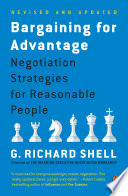

Negotiation is an essential skill in both personal and professional life. The book emphasizes that negotiation is not merely about haggling over prices or terms; it's about creating value for all parties involved. The author, G. Richard Shell, introduces the concept of a 'negotiation dance' where both sides must understand each other's needs, interests, and constraints. This understanding can lead to win-win situations, fostering long-term relationships and successful outcomes. Shell also points out that negotiation is influenced by various factors such as culture, context, and individual personalities. Recognizing these elements can help negotiators adapt their strategies accordingly, leading to more effective results.
Continue readingPreparation is critical to successful negotiation. The book outlines a structured approach to preparing for negotiations, which includes researching the other party's needs, interests, and alternatives. Shell emphasizes the importance of knowing your own goals and limits, as well as understanding the broader context of the negotiation. He provides practical tools and frameworks for assessing the situation and formulating a strategy. The author also stresses that preparation goes beyond just gathering information; it involves anticipating objections and developing responses. By being well-prepared, negotiators can approach discussions with confidence and clarity, significantly improving their chances of success.
Continue readingPower dynamics play a crucial role in negotiations. Shell explores the different sources of power that negotiators can leverage, such as information, expertise, and relationships. He discusses the concept of 'BATNA' (Best Alternative to a Negotiated Agreement), which helps negotiators understand their options if the negotiation doesn't go as planned. The greater the BATNA, the more power a negotiator has. Shell warns against relying solely on positional power, such as hierarchy or authority, as it can lead to adversarial relationships. Instead, he advocates for building collaborative power through trust and mutual respect, which can lead to more favorable outcomes for all parties involved.
Continue readingNegotiation is not just a logical process; it is also deeply psychological. Shell delves into the emotional and cognitive factors that influence decision-making during negotiations. He discusses concepts such as anchoring, framing, and loss aversion, which can significantly impact how negotiators perceive offers and counteroffers. Understanding these psychological principles can help negotiators craft their messages more effectively and respond to the other party's tactics. The author also highlights the importance of emotional intelligence in negotiations, as being attuned to one's own emotions and those of others can facilitate better communication and rapport.
Continue readingShell presents a variety of strategies and tactics that negotiators can employ to enhance their effectiveness. He categorizes these strategies into 'competitive' and 'collaborative' approaches, explaining when to use each based on the context of the negotiation. The book provides practical examples and case studies to illustrate these strategies in action. Shell emphasizes the importance of flexibility and adaptability during negotiations, as circumstances can change rapidly. He encourages negotiators to remain open-minded and willing to explore creative solutions that can satisfy the interests of both parties.
Continue readingEthics is a critical component of negotiation that Shell addresses thoughtfully. He discusses the fine line between persuasion and manipulation, urging negotiators to maintain integrity and fairness throughout the process. The author emphasizes that ethical negotiations build trust and credibility, which are essential for long-term relationships. Shell provides guidance on how to navigate ethical dilemmas that may arise during negotiations, encouraging readers to reflect on their values and the potential consequences of their actions. He argues that ethical behavior not only enhances individual reputations but also contributes to a healthier negotiation environment overall.
Continue readingClosing a negotiation is often the most challenging part of the process. Shell outlines effective techniques for reaching an agreement and finalizing the details. He stresses the importance of summarizing key points, addressing any remaining concerns, and ensuring that both parties feel satisfied with the outcome. The author provides insights into how to create a sense of urgency and commitment, which can help facilitate a successful close. Additionally, he discusses the significance of follow-up after the negotiation, as maintaining the relationship and ensuring that the agreement is implemented effectively can lead to future opportunities.
Continue readingThe reading time for Bargaining for Advantage depends on the reader's pace. However, this concise book summary covers the 7 key ideas from Bargaining for Advantage, allowing you to quickly understand the main concepts, insights, and practical applications in around 23 min.
Bargaining for Advantage is definitely worth reading. The book covers essential topics including The Nature of Negotiation, The Importance of Preparation, The Role of Power in Negotiation, providing practical insights and actionable advice. Whether you read the full book or our concise summary, Bargaining for Advantage delivers valuable knowledge that can help you improve your understanding and apply these concepts in your personal or professional life.
Bargaining for Advantage was written by G. Richard Shell.
If you enjoyed Bargaining for Advantage by G. Richard Shell and want to explore similar topics or deepen your understanding, we highly recommend these related book summaries:
These books cover related themes, complementary concepts, and will help you build upon the knowledge gained from Bargaining for Advantage. Each of these summaries provides concise insights that can further enhance your understanding and practical application of the ideas presented in Bargaining for Advantage.